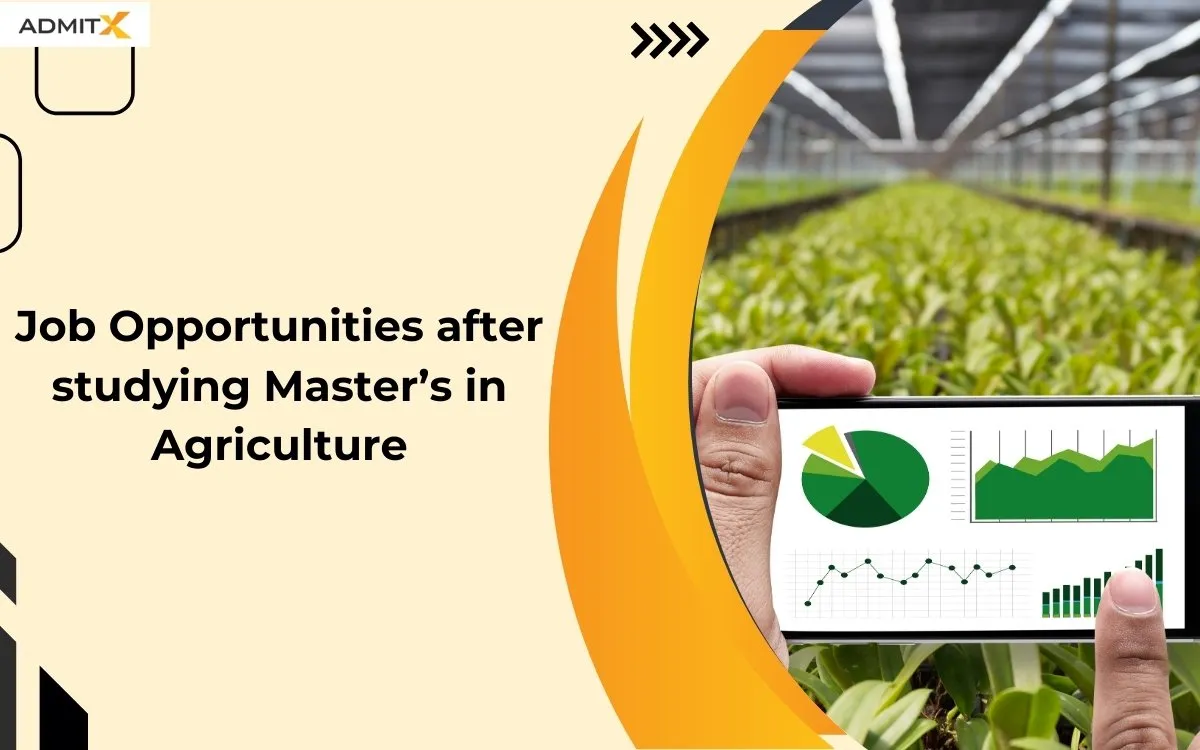
Job Opportunities after studying Masters in Agriculture
Agriculture Science is the branch of science concerned with the production, procurement, and processing of food products and their derivatives. It involves implementing principles and applying biology, chemistry, and genetics to agricultural and horticultural practices to meet the food demand of the growing population. Agriculture science has many other sub-disciplines, such as food science, agriculture economics, agriculture engineering, soil science, nematology, and plant genetics.
This blog outlined the important career aspects of a MSc agriculture jobs
- Top Reasons to Pursue M.Sc Agriculture Science
- Popular Jobs after an M.Sc Agriculture Science
- Jobs after Master’s in Agriculture: Popular Specialisations
- M.Sc Agriculture Science: Country-wise Jobs & Salaries
- Jobs after M.Sc Agriculture Science: Experience-wise Salary Distribution
- Jobs after M.Sc Agriculture Science: Payback Period
- Conclusion
- FAQs
Top Reasons to Pursue M.Sc Agriculture Science
Here are the important reasons to pursue an M.Sc in Agriculture Science abroad.
Opportunities for Exploration: Agriculture science students get opportunities to visit the field locations where different types of agriculture practices are usually conducted in different environments.
Diverse Scope: Students pursuing an M.Sc in Agriculture Science can opt to study organic farming, biotechnology, fisheries, horticulture, etc., which opens doors for research and employment in diverse fields.
Job Security: A master’s in agriculture science student can pursue entrepreneurial opportunities by starting an organic farm or providing consultancy services to advise farmers and young graduates.
Popular Jobs after an M.Sc Agriculture Science
The popular jobs after completing a master’s in agriculture science degree program abroad are tabulated below.
| Job Post | Average Salary (Per Year) |
|---|---|
| Agronomist | INR 52 Lakh-56 Lakh |
| Horticulture Scientist | INR 35 Lakh-50 Lakh |
| Biotechnologist | INR 30 Lakh-50 Lakh |
| Cell Biologist | INR 41 Lakh-72 Lakh |
| Aquaculturist | INR 50 Lakh-50 Lakh |
| Food Scientist | INR 50 Lakh-65 Lakh |
Jobs after Master’s in Agriculture: Popular Specialisations
The time has gone by when people considered agricultural practices outdated. As the earth faces the challenges of providing sufficient food resources to a growing population, that so-called convention of ‘outdated’ agriculture practices comes into the limelight with a transformation.
Agriculture Business: It deals with the practical application of business and finance to agricultural products to make them commercially valuable. It involves producing, processing, and distributing farm products in the markets to meet food demand.
Horticulture: Horticulture involves cultivating and harvesting garden crops such as fruits, flowers, and vegetables for medicinal, industrial, and domestic purposes.
Soil Science: Soil science deals with studying the composition and properties of the land soil on which agriculture or horticultural practices are to be conducted. It provides a complete description of the soil’s nature and helps assess human activities on it.
Agriculture Engineering: Agriculture engineering is the branch of agriculture science where technology and engineering science play an important role, from managing agricultural land to distributing crops and derivative products in the market.
Sustainable Agriculture: It involves the methodologies of farming practices in a way that does not hamper the environment, deplete the natural resources, and harm the farmers and communities.
M.Sc Agriculture Science: Country-wise Jobs & Salaries
Below, we have provided the country-wise job descriptions and their annual salaries in tabulated form, which will help you estimate the average salary of an M.Sc agriculture science graduate abroad.
United States of America (USA)
In the USA, the following agriculture jobs are available to an M.Sc Agriculture Science graduate. Some top recruiters are Cargill, Syngenta, Bayer, Monsanto, AGCO, CropX, etc.
| Job Post | Average Salary (Per Year) |
|---|---|
| Cell Biologist | USD 49,000-87,000 (INR 41 Lakh-72 Lakh) |
| Aquaculturist | USD 49,000-92,000 (INR 41 Lakh-76 Lakh) |
| Food Scientist | USD 60,000-100,000 (INR 50 Lakh-83 Lakh) |
| Wildlife Manager | USD 51,000-79,000 (INR 42 Lakh-66 Lakh) |
| Farm Manager | USD 43,000-72,000 (INR 35 Lakh-60 Lakh) |
United Kingdom (UK)
Below are some popular jobs in the UK after a master’s in agriculture science. The top recruiters are Bayer, Syngenta, BASF, KWS, Limagrain, etc.
| Job Post | Average Salary (Per Year) |
|---|---|
| Agronomist | GBP 26,000-46,000 (INR 29 Lakh-51 Lakh) |
| Industrial Scientist | GBP 29,000-40,000 (INR 32 Lakh-44 Lakh) |
| Agricultural Technologist | GBP 28,000-42,000 (INR 31 Lakh-46 Lakh) |
| Food Scientist | GBP 20,000-39,000 (INR 22 Lakh-43 Lakh) |
| Farmer | GBP 23,000-30,000 (INR 25 Lakh-33 Lakh) |
Canada
After completing a Master’s in Agriculture Science, international students can pursue the following job opportunities. The top agriculture companies in Canada are Syngenta, Health Canada, Bayer Crop Science, and the Ontario Ministry of Agriculture and Agri-Food Canada.
| Job Post | Average Salary (Per Year) |
|---|---|
| Agronomist | CAD 55,000-83,000 (INR 34 Lakh-51 Lakh) |
| Horticulture Scientist | CAD 57,000-82,000 (INR 35 Lakh-50 Lakh) |
| Biotechnologist | CAD 46,000-74,000 (INR 28 Lakh-74 Lakh) |
| Food Scientist | CAD 54,000-78,000 (INR 33 Lakh-48 Lakh) |
| Farmer | CAD 40,000-60,000 (INR 24 Lakh-37 Lakh) |
Germany
In Germany, the following agriculture jobs are available to an M.Sc Agriculture Science graduate. Some top recruiters are BASF, Syngenta AG, AGCO Corporation, Bayer Crop Science, EuroChem, and Nestle.
| Job Post | Average Salary (Per Year) |
|---|---|
| Agronomist | EUR 56,000-61,000 (INR 52 Lakh-56 Lakh) |
| Agronomist | EUR 47,000-67,000 (INR 43 Lakh-62 Lakh) |
| Senior Crop Researcher | EUR 62,000-68,000 (INR 57 Lakh-63 Lakh) |
| Agriculture Engineer | EUR 50,000-70,000 (INR 46 Lakh-65 Lakh) |
| Agriculture Scientist | EUR 52,000-56,000 (INR 48 Lakh-52 Lakh) |
Australia
Some popular jobs in Australia after a master’s in agriculture science are tabulated below. The top recruiters are CSIRO, GrainCorp, Bayer Australia, Cargill, and Costa Group.
| Job Post | Average Salary (Per Year) |
|---|---|
| Agronomist | AUD 69,000-91,000 (INR 39 Lakh-52 Lakh) |
| Agricultural Consultant | AUD 50,000-75,000 (INR 28 Lakh-43 Lakh) |
| Environmental Manager | AUD 85,000-100,000 (INR 48 Lakh-57 Lakh) |
| Land Economist | AUD 85,000-100,000 (INR 48 Lakh-57 Lakh) |
| Biotechnologist | AUD 60,000-100,000 (INR 34 Lakh-57 Lakh) |
Rest of Europe
Below is a tabulation of some popular agriculture jobs. The top recruiters are Ferrero, CAVIT, Borges, Syngenta, and Glanbia.
| Job Post | Average Salary (Per Year) |
|---|---|
| Food Quality Control Specialist | EUR 27,000-47,000 (INR 25 Lakh-43 Lakh) |
| Ecologist | EUR 32,000-40,000 (INR 29 Lakh-47 Lakh) |
| Dairy Farm Manager | EUR 40,000-45,000 (INR 37 Lakh-41 Lakh) |
| Ecologist | EUR 25,000-45,000 (INR 23 Lakh-41 Lakh) |
| Food Scientist | EUR 24,000-45,000 (INR 22 Lakh-41 Lakh) |
Jobs after M.Sc Agriculture Science: Experience-wise Salary Distribution
Below, we have provided a general overview of the experience-wise distribution of the basic remuneration or compensation for the agriculture science job roles.
| Years of Experience | Average Salary (Per Year) |
|---|---|
| 1-3 | INR 20 Lakh-35 Lakh |
| 3-5 | INR 35 Lakh-45 Lakh |
| 5-10 | INR 45 Lakh-60 Lakh |
| 10+ | INR 60 Lakh |
Jobs after M.Sc Agriculture Science: Payback Period
The amount of time in which students are estimated to recover their total investment of tuition fees and living expenses is referred to as the payback period. We have calculated the estimated payback period for several countries using the following formula:
Payback Period = Initial Investment/Total Cash Flow
Here, initial investment implies the total cost of study and cost of living, whereas total cash flow means the total salary earned in a year on a particular job post.
It is important to note that the below calculations are only for illustration purposes and are not to be meant as a guarantee of salary/jobs.
| USA | UK | Germany | Canada | Australia | Rest of Europe |
|
|---|---|---|---|---|---|---|
| Annual Tuition Fees (A) | USD 20 k-60 k | GBP 15 k-45 k | EUR 2 k-30 k | CAD 15 k-50 k | 35 k-55 k | EUR 3 k-28 k |
| Annual Living Expenses (B) | USD 15-29 k | GBP 10 k-18 k | EUR 13 k-15 k | CAD 15 k-30 k | AUD 20 k-35 k | EUR 10 k-15 k |
| Course Duration (C) | 1 Year | 1 Year | 2 Year | 2 Year | 2 Year | 2 Year |
| Total Investment [(A+B)xC] | USD 70 k-178 k | GBP 50 k-63 k | EUR 30 k-90 k | CAD 60 k-160 k | AUD 110 k-180 k | EUR 26 k-86 k |
| Annual Salary | USD 40 k-100 k | GBP 20 k-50 k | EUR 45 k-70 k | CAD 40 k-90 k | AUD 45 k-100 k | EUR 22 k-45 k |
| Net Salary (Annual Salary-Living Expenses) | USD 35 k-71 k | GBP 10 k-32 k | EUR 32 k-55 k | CAD 35 k-60 k | AUD 25 k-65 k | EUR 12 k-30 k |
| Payback Period/ROI | 2-2.5 Years | 2-5 Years | 2 Years | 1-2 Years | 3-4 Years | 3 Years |
Conclusion
An M.Sc Agriculture Science abroad can open doors for exciting job opportunities to those who have a basic understanding of biology, chemistry, and genetics and want to utilise their skills for the welfare of the global community. With the growing population and limited natural resources, food scarcity and the availability of hygienic food products are significant challenges.
Different global universities have bought specialised degree programs in agriculture science aimed at providing education and training to students to help industries, farmers, and communities tackle such challenges.
If you are an aspirant looking to study at your dream university, book an appointment with AdmitX today and start your applications early to avail yourself of all the benefits.
FAQs
How do I find a job after a master's in agriculture science program?
To get a job in the agriculture field after a master’s program abroad, students must prepare themselves by participating in university career development programs. These programs help students prepare for employment opportunities through workshops, employment fairs, career counselling, etc.
Which subject is better for agriculture?
Biology, chemistry, plant physiology, biotechnology, economics, and business and management are some important subjects for studying agriculture.
What are some agriculture companies that are available for a job after an M.Sc in agriculture?
Some world-renowned recruiters are Syngenta, Health Canada, Bayer Crop Science, CSIRO, GrainCorp, Bayer Australia, Cargill, AGCO, and CropX.
What are the skills required to become an agricultural scientist?
Some important skills required to become an agricultural scientist are problem-solving, data analysis, communication, observation, time management, and data collection.
Do universities offer placement assistance to students abroad?
Most universities abroad offer placement assistance to their master’s in agriculture science students through organising career fairs, workshops, internship fairs, career development seminars, and skill development conclaves.







